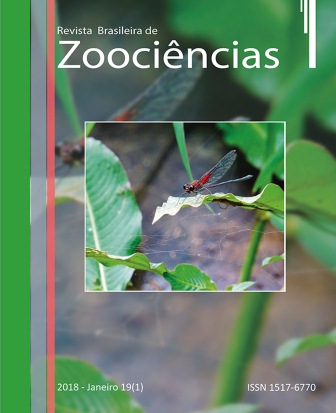Geographic distribution, habitat use and vocalizations of the leaf-litter frog Ischnocnema henselii (Anura: Brachycephalidae) in the subtropical Atlantic Forest
DOI:
https://doi.org/10.34019/2596-3325.2018.v19.24729Resumo
Data on geographic distribution and ecology are essential when defining the conservation status of a species. Herein, we present new information about the geographic distribution, habitat and advertisement call of Ischnocnema henselii, an endemic species of the southern Atlantic Forest. We conducted this study in forest fragments in the state of Santa Catarina, Southern Brazil, from January 2008 to November 2012. We recorded I. henselii in eight fragments over 100 ha in size, both inside and outside conservation units. We often observed less than 20 males in calling activity. The calling activity was daytime and nighttime, and more intense in the rain. We observed individuals perched on vegetation, on leaves or branches, on the leaf litter or under tree trunks. Duration of advertisement calls ranged from 14.71 ± 1.68 s (n = 11 calls) and interval between notes was 0.22 ± 0.13 s (n = 99 notes). We observed that the advertisement calls had a feature that we call "alternating modulation" in the amplitude of the notes. We suggest that further bioacoustic studies should analyze the relevance of this alternating modulation, to understand its role in communication. Although I. henselii is a habitat specialist, it is currently considered a common species, classified as Least Concern by Brazilian and IUCN lists. In the region studied, characterized by small and isolated remnants of the Atlantic Forest, I. henselii is not an abundant species and its spatial distribution is always associated with wet forest fragments. The increasing degradation of forest remnants in this region causes microclimatic and structural changes that may compromise the permanence of strictly forest and moisture-dependent species for reproduction, such as I. henselii.Downloads
Não há dados estatísticos.
Downloads
Publicado
2018-01-06
Edição
Seção
Artigos



